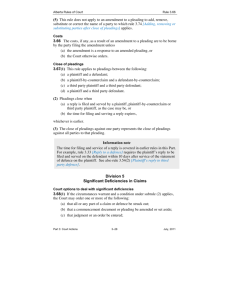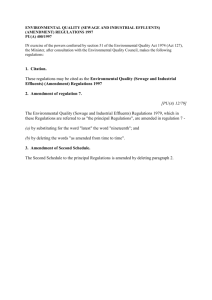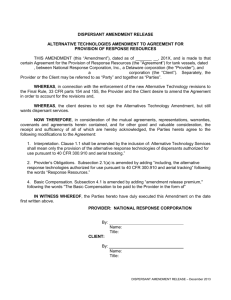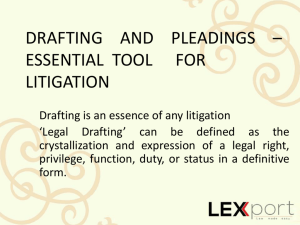JAS PROGRESSIVE (U) LTD V TROPICAL AFRICA BANK LTD
advertisement
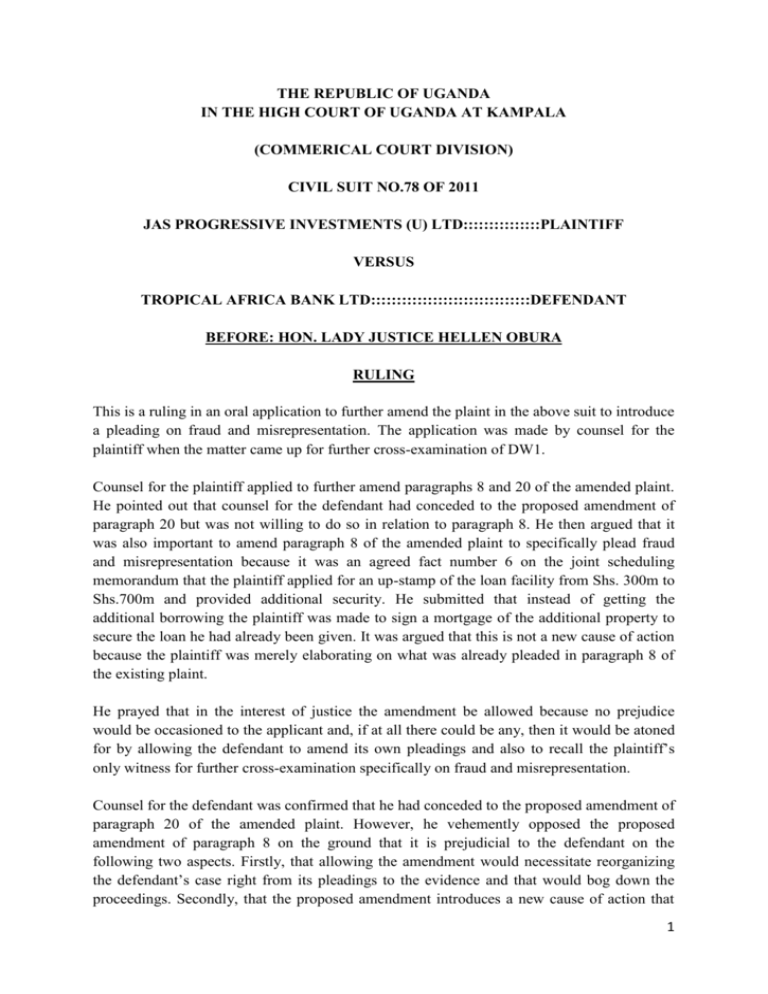
THE REPUBLIC OF UGANDA IN THE HIGH COURT OF UGANDA AT KAMPALA (COMMERICAL COURT DIVISION) CIVIL SUIT NO.78 OF 2011 JAS PROGRESSIVE INVESTMENTS (U) LTD:::::::::::::::PLAINTIFF VERSUS TROPICAL AFRICA BANK LTD:::::::::::::::::::::::::::::::DEFENDANT BEFORE: HON. LADY JUSTICE HELLEN OBURA RULING This is a ruling in an oral application to further amend the plaint in the above suit to introduce a pleading on fraud and misrepresentation. The application was made by counsel for the plaintiff when the matter came up for further cross-examination of DW1. Counsel for the plaintiff applied to further amend paragraphs 8 and 20 of the amended plaint. He pointed out that counsel for the defendant had conceded to the proposed amendment of paragraph 20 but was not willing to do so in relation to paragraph 8. He then argued that it was also important to amend paragraph 8 of the amended plaint to specifically plead fraud and misrepresentation because it was an agreed fact number 6 on the joint scheduling memorandum that the plaintiff applied for an up-stamp of the loan facility from Shs. 300m to Shs.700m and provided additional security. He submitted that instead of getting the additional borrowing the plaintiff was made to sign a mortgage of the additional property to secure the loan he had already been given. It was argued that this is not a new cause of action because the plaintiff was merely elaborating on what was already pleaded in paragraph 8 of the existing plaint. He prayed that in the interest of justice the amendment be allowed because no prejudice would be occasioned to the applicant and, if at all there could be any, then it would be atoned for by allowing the defendant to amend its own pleadings and also to recall the plaintiff’s only witness for further cross-examination specifically on fraud and misrepresentation. Counsel for the defendant was confirmed that he had conceded to the proposed amendment of paragraph 20 of the amended plaint. However, he vehemently opposed the proposed amendment of paragraph 8 on the ground that it is prejudicial to the defendant on the following two aspects. Firstly, that allowing the amendment would necessitate reorganizing the defendant’s case right from its pleadings to the evidence and that would bog down the proceedings. Secondly, that the proposed amendment introduces a new cause of action that 1 will change the course of the proceedings. He therefore prayed that the application be denied and the matter proceeds for hearing. I have carefully listened to the submissions and properly addressed my mind to the law and principles that govern amendment of pleadings. Order 6 rule 19 of the Civil Procedure Rules provides:“The court may at any stage of the proceedings, allow either party to alter or amend his or her pleadings in such manner and on such terms as may be just, and all such amendments shall be made as maybe necessary for the purpose of determining the real questions in controversy between the parties”. This rule gives court discretion to allow an application for amendment of pleadings and I am alive to the fact that this is a judicial discretion which must not be exercised arbitrarily but judiciously. As a general rule, leave to amend will be granted so as to enable the real question in issue between the parties to be raised on the pleadings, where the amendment will occasion no injury to the opposite party, except such as can be sufficiently compensated for by costs or other terms to be imposed by the order. Leave to amend must always be granted unless the party applying was acting mala fide and where it is not necessary for determining the real question in controversy between the parties. The application to amend must be made bona fide and made in good faith. See Mulla , The Code of Civil Procedure, 17th Edition Volume 2, at pages 333, 334 and 335. In Gaso Transport Services (Bus) Ltd v Obene (supra) Tsekooko, JSC stated that the four principles that appear to be recognized as governing the exercise of discretion in allowing amendments are:1. “The amendment should not work injustice to the other side. An injury which can be compensated by an award of costs is not treated as an injustice. 2. Multiplicity of proceedings should be avoided as far as possible and all amendments which avoid such multiplicity should be allowed. 3. An application which is made mala fide should not be granted. 4. No amendment should be allowed where it is expressly or impliedly prohibited by any law (for example limitation actions)”. Courts have also taken the view that an amendment that substitutes one distinct cause of action for another or change the subject matter of the suit or that which would change the action into one of a substantially different character should not be allowed. This was stated in the case of Eastern Bakery v Castelino [1958] EA 462 (CAU) where Sir Kenneth O’Connor referred to the cases of Ma Shwe Mya v. Maung Po Hnaung (4) (1921) 48 I.A 214; 48 Cal. 82 and Raleigh v Goschen (5) [1898] 1 Ch. 73, 81. 2 According to Odgers on Pleadings and Practice 20th Edition at page 170, where the amendment is necessary to enable justice to be done between the parties, it will be allowed in terms even at a late stage provided the application is not made mala fide and will not cause undue delay, or will not in any way unfairly prejudice the other party. Applying the above principles to the instant case, I have had the opportunity to peruse the pleadings, the joint scheduling memorandum and the evidence so far adduced by the parties as well as considered the arguments for and against the application and my observation is, first of all, that the proposed further amendment of paragraph 8 of the amended plaint if allowed will only cause inconveniences to the defendant but not injury and/ or prejudices that cannot be atoned for by way of costs. The arguments of the defendant on being bogged down by the necessity to also amend its pleadings, file additional witness statement and recall the plaintiff’s witness for further cross-examination are, in my view, merely inconveniences which is envisaged by Order 6 rule 19 which gives court discretion to allow amendment of pleadings at any stage of the proceedings. Of course this court is mindful of the fact that each case must be decided according to its own facts and circumstances and that is why it is of the firm view that looking at the facts and circumstances of this case, the inconveniences highlighted above can be accommodated in the interest of ensuring that all issues pertaining to this case is addressed in accordance with section 33 of the judicature Act and the interest of justice is served. Secondly, I do not agree that the proposed amendment raises a very distinct cause of action from what the plaintiff has all along maintained in its pleadings and evidence. The only difference is that the word fraud and misrepresentation were never specifically used but it has been its case that the mortgage it was made to sign was for additional security for the loan it had already obtained and not for up-stamp of the facility it had applied for, made to provide security for and assured it would get. For the above reasons, I find that the proposed amendment does not offend the law and principle for amendment of pleadings and it is accordingly granted with the following orders: 1. The further amended plaint shall be filed and served by close of business tomorrow 28th May 2014. 2. The defendant shall file and serve its further amended written statement of defence within seven days from the date of service of the further amended plaint. 3. The plaintiff shall file and serve a reply, if any, to the further amended written statement of defence within three days from the date of service of the further amended written statement of defence. 4. The defendant shall file and serve its additional witness statement by 15th July 2014. 5. The plaintiff’s only witness shall be recalled on the next hearing date for crossexamination on the aspects of fraud and misrepresentation. 6. The plaintiff shall pay the defendant costs of this application. I so order. 3 Dated this 27th day of May 2014 Hellen Obura JUDGE Delivered in open court in the presence of:1. Mr. Nester Byamugisha for the applicant/plaintiff 2. Mr. John Mike Musisi for the respondent/defendant. 3. Mr. Abubaker Mohamed the Managing Director of the plaintiff company 4. Mrs. Addah Wegulo the Bank Secretary of the defendant bank. JUDGE 27/05/14 4
